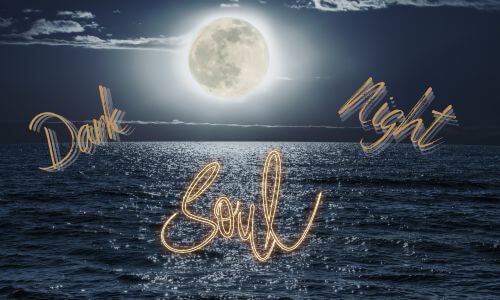Have you ever found yourself in a place of profound spiritual distress or experienced what feels like an impenetrable darkness encompassing your soul? I have. I have been through several "dark nights" on my spiritual journey. If you have as well, you might be familiar with the concept of "The Dark Night of the Soul."
In the realm of Christian spirituality, one encounters various stages of growth and transformation. One of the most profound and challenging experiences is known as "The Dark Night of the Soul." By the way, we recently published an article regarding inward prayer: Unveiling the Secrets of Inward Prayer: Deepening Your Spiritual Experience that goes well with this article as both deal with inward Christian spirituality.
Often misunderstood and confused with regular depression, the Dark Night of the Soul is a deeply spiritual phenomenon that goes beyond mere psychological distress. In this investigative article, we will delve into what this truly is, what it isn't, and how it relates to the realm of spirituality.
"The Dark Night of the Soul," a term coined by Saint John of the Cross, a 16th-century Spanish mystic, refers to a period of intense spiritual desolation and struggle. It's not your everyday sadness or even clinical depression; it's a deep-seated spiritual crisis that can lead to profound transformation and growth.

A Deep Dive into the Dark Night
As stated above, the term "Dark Night of the Soul" finds its roots in the writings of a 16th-century Spanish mystic and poet, Saint John of the Cross. In his poem, "Dark Night of the Soul" ("La Noche Oscura del Alma"), he described a profound spiritual crisis experienced during one's journey towards union with God. (We've included a copy of that poem at the end of this article.)
It is a period of intense inner struggle, doubt, and a feeling of spiritual abandonment. It is a time when individuals may feel disconnected from the Divine, causing profound emotional and psychological turmoil.
According to St. John of the Cross, the Dark Night is a phase where the Holy Spirit secretly carries out a deep work within the human spirit. It's a developmental stage of spirituality, marked by a sense of abandonment by the Divine.
It's important to note here that this isn't a punishment or a sign of spiritual failure. Instead, it's a purifying process, meant to strip away attachments and bring about a deeper union with God.

Spiritual Transformation vs. Depression
While the symptoms may resemble those of depression on the surface, the underlying causes and context are vastly different. It is crucial to distinguish between the two to avoid misinterpretations and misdiagnoses.
Several key differences set the Dark Night of the Soul apart from regular depression:
- Transcendent Context:
The Dark Night of the Soul is rooted in spiritual growth and transformation. It often occurs to those who are deeply committed to their spiritual path and are seeking a closer connection with God. In contrast, depression is primarily a psychological disorder with no necessary spiritual dimension. - Voluntary or Involuntary:
It is typically an involuntary experience that arises spontaneously during the spiritual journey. On the other hand, depression can be triggered by various external factors, life events, a life-threatening illness, or chemical imbalances. - Absence of External Causes:
Depression often stems from external stressors, such as trauma, loss, or adverse life events. In contrast, the Dark Night of the Soul can manifest without any apparent external cause, arising solely from the profound inner transformation happening within the individual. - Non-responsive to External Solutions:
Depression may improve with psychological intervention, medication, or lifestyle changes. The Dark Night of the Soul, however, is unlikely to be alleviated through conventional means. Instead, it demands a deep introspective and spiritual journey to overcome.

The Dark Night and Psychiatry
The experience of the Dark Night is seen as a potentially positive event in psychological development, leading to greater wisdom, growth, and acceptance.
It's important to note that this doesn't mean the process is a walk in the park – it can be an incredibly painful period and difficult. But often individuals who have gone through this journey come out on the other side as reshaped and transformed individuals.

Experiencing the Dark Night of the Soul
This is not a singular experience but rather a multi-faceted and unique journey for each individual. However, several common characteristics define this spiritual crisis:
- Profound Doubt:
During the Dark Night, individuals may question their beliefs, practices, and even the existence of a higher power. Doubt becomes an integral part of the process, leading to a deeper understanding of faith and spirituality. - Ego Dissolution:
The ego, the sense of self or identity, is confronted and challenged. This dissolution of the ego allows individuals to transcend their limiting beliefs and attachments, paving the way for spiritual growth. - Emotional Turmoil:
Intense emotions, such as fear, sadness, and despair, are often experienced during the Dark Night. These emotions can be overwhelming but are seen as opportunities for transformation and healing. - The Feeling of Abandonment:
As individuals detach from their previous understanding of the Divine, they may experience a sense of isolation and abandonment. This feeling is an integral part of the process, leading to a deeper connection with God.

Navigating Through the Dark Night
While the Dark Night of the Soul is undoubtedly challenging, it is not without purpose or meaning. It is essential to approach this spiritual crisis with acceptance and openness. Various spiritual traditions offer guidance on how to navigate through this transformative period:
- Surrender:
Embracing the Dark Night requires surrendering to the process rather than resisting it. Allowing oneself to go through the emotions and experiences without judgment is crucial to spiritual growth and spiritual awakening. - Spiritual Practice:
Engaging in spiritual practices, such as meditation, prayer, or mindfulness, can provide solace and clarity. These practices can help individuals reconnect with their spiritual essence. I personally found that prayer is the key and so essential during this dark time. - Seek Support:
While this spiritual depression is a solitary experience, seeking support from like-minded individuals or spiritual teachers or mentors can offer guidance and validation. Sharing experiences with others can alleviate the sense of isolation. - Self-Compassion:
Practicing self-compassion and self-care is essential during this period of vulnerability. Avoiding self-criticism and embracing self-love can facilitate healing and transformation.

If you've found yourself asking many questions, you're not alone. Many have walked this path before us and emerged stronger on the other side. So let's tackle these questions one by one.
What are you supposed to do in the dark night of the soul?
Embrace it! The Dark Night of the Soul is not a punishment but rather an invitation to grow spiritually. It's a time to let go of attachments, reflect deeply, and open up to the divine. You're being guided toward a profound transformation.
How do you know when the dark night of the soul is ending?
You'll start to feel a sense of relief and understanding. The intense suffering will begin to fade, and you'll find yourself with a renewed sense of purpose and a deeper connection to the divine.
How long can the dark night of the soul last?
There's no set timeline. For some, it may last a few months; for others, several years. Remember, it's not a race but a journey toward spiritual growth.
Does the dark night of the soul happen to everyone?
Not necessarily. It's a profound spiritual crisis that usually occurs in those deeply committed to their spiritual journeys. However, anyone can experience these periods that can lead to growth
What does the dark night of the soul mean spiritually?
It signifies a period of spiritual desolation where one feels abandoned by the Divine. But it's also a transformative process leading to a deeper union with God and significant spiritual growth.
What is the difference between depression and the Dark Night of the Soul?
While both involve intense suffering, clinical depression is a mental health disorder requiring medical intervention. The Dark Night, on the other hand, is a spiritual crisis leading to growth
Why is it called the dark night of the soul?
The term comes from a poem by Saint John of the Cross, where he likens the journey to God to a dark night. It represents the hardships and struggles faced on the spiritual path.
How does the darkness show its sadness?
In the context of the Dark Night, the darkness represents a feeling of spiritual abandonment and despair. It's not so much that the darkness is sad, but rather that it embodies the profound spiritual distress one experiences during this phase.
Why does being in the dark make you sad?
Darkness often symbolizes uncertainty, fear, and isolation, which can lead to feelings of sadness. In the Dark Night, this sense of darkness is more about feeling spiritually lost or abandoned
Remember, it's okay to feel lost or confused during the Dark Night. It's all part of your spiritual journey. And when you emerge on the other side, you'll find yourself stronger, wiser, and closer to God.

The Dark Night of the Soul is a profound and challenging experience on the path of spirituality. Often misunderstood and mistaken for depression, it is a deeply transformative process that goes beyond psychological distress.
Rooted in spiritual growth, it demands acceptance, surrender, and introspection. By distinguishing it from regular depression and acknowledging its spiritual significance, individuals can embrace the Dark Night as an opportunity for profound growth, spiritual awakenings, and self-discovery on their spiritual journey.
I'll leave you with this poignant statement from Jeanne Guyon and her book on inward prayer and seeking the Holy Spirit within: "Draw me unto Thee, O my Divine Centre, by the secret springs of my existence, and all my powers and senses shall follow Thee."
Footnotes
- Musings on the dark night of the soul: Insights from St. John of the Cross on a developmental spirituality
- The Dark Night of the Soul: spiritual distress and its psychiatric implications
- “Dark nights of the soul”: Phenomenology and neurocognition of spiritual suffering in mysticism and psychosis
- Saint John of the Cross. "Dark Night of the Soul." (https://www.ccel.org/ccel/john_cross/dark_night.html)
- Bourgeault, Cynthia. "The Wisdom Jesus: Transforming Heart and Mind – A New Perspective on Christ and His Message." Shambhala Publications, 2008.
- Moore, Thomas. "Dark Nights of the Soul: A Guide to Finding Your Way Through Life's Ordeals." Gotham, 2004.
- May, Gerald G. "The Dark Night of the Soul: A Psychiatrist Explores the Connection Between Darkness and Spiritual Growth." HarperOne, 2005.
Here is a copy of the poem "Dark Night of the Soul"
Dark Night of the Soul
On a dark night,
Kindled in love with yearnings
–oh, happy chance!–
I went forth without being observed,
My house being now at rest.
In darkness and secure,
By the secret ladder, disguised
–oh, happy chance!–
In darkness and in concealment,
My house being now at rest.
In the happy night,
In secret, when none saw me,
Nor I beheld aught,
Without light or guide, save that which burned in my
heart.
This light guided me
More surely than the light of noonday
To the place where he (well I knew who!) was awaiting me–
A place where none appeared.
Oh, night that guided me,
Oh, night more lovely than the dawn,
Oh, night that joined Beloved with lover,
Lover transformed in the Beloved!
Upon my flowery breast,
Kept wholly for himself alone,
There he stayed sleeping, and I caressed him,
And the fanning of the cedars made a breeze.
The breeze blew from the turret
As I parted his locks;
With his gentle hand he wounded my neck
And caused all my senses to be suspended.
I remained, lost in oblivion;
My face I reclined on the Beloved.
All ceased and I abandoned myself,
Leaving my cares forgotten among the lilies.
Source: "Dark Night of the Soul" by St. John of the Cross
Editor's Note: The book "Dark Night of the Soul" goes into depth explaining each stanza if you want to delve into it deeper. You can find it in your public library, a used book store, or Amazon.
Thank you for visiting our Christian blog, and we look forward to more sharing of our passion for Christian theology and literature with you!










Member discussion